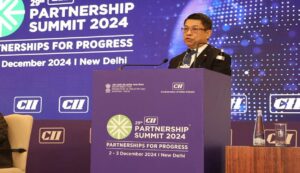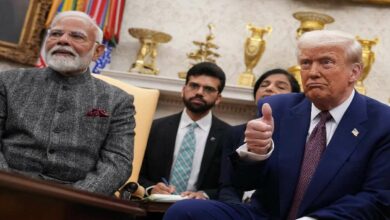Bhutan’s Commerce and Employment Minister lauded India’s role, saying, India is a pillar of support and inspiration for Thimphu
Lyonpo Namgyal Dorji, Bhutan’s Minister of Industry, Commerce, and Employment, hailed India as a “closest partner,” saying New Delhi is a source of inspiration and support for Thimphu. He said that India supports Bhutan’s goals because of the two countries’ mutual trust and similar ideals.

“India’s role as Bhutan’s closest partner is not only a pillar of support but also an inspiration,” Dorji said at Monday’s opening session of the 29th Confederation of Indian Industry (CII) Partnership Summit 2024 in Delhi. Because of our mutual trust, cooperation, and similar ideals, India is able to support Bhutan’s ambitions. Beyond herself, India gives us access to chances, contacts, and interactions. The two nations are excited by this spirit of cooperation and reciprocal development.
As a “example of India’s leadership, its commitment to fostering innovation, inclusivity, and shared prosperity across Asia and the larger world,” Dorji characterized the CII Partnership Summit. He also emphasized how India has become a worldwide leader for countries like Bhutan under Prime Minister Narendra Modi.
“India has become a worldwide leader for nations like Bhutan under Prime Minister Modi’s direction. In addition to being a reliable neighbor, India is a partner in our path of development and change, providing us with motivation and encouragement as we work toward our goals,” he said.
“Leveraging this partnership, Bhutan has embarked on a transformative care strategic plan to evolve into a high income, Gross National Happiness, economic central Environment Initiative,” he said.
“My pitch here is that for investors thriving in India or seeking opportunities in the region, the futuristic city project at Bhutan offers unparalleled potential,” Dorji said, urging them to investigate prospects in Bhutan. We cordially encourage you to come to Bhutan and consider the potential for collaboration on a project that skillfully combines purpose and profitability, establishing a cost-effective framework to link high-value sectors.”
Thirty international speakers, eleven international ministers, and 61 participating nations convened the 29th CII Partnership Summit. In order to ensure a common vision for a sustainable and successful future, the summit seeks to promote fruitful alliances and international collaboration.
During the conference, Ahmed Mohammed Al Sayed, Qatar’s Minister of State for Foreign Trade, highlighted his nation’s robust economic diversification policy. “With our development plan, which includes metro and highway projects with industry, Qatar has established itself as a robust pathway for economic diversification.
Our concentration is on digital transformation, logistics, and IT in both the public and commercial sectors,” he said.
He remembered Prime Minister Narendra Modi’s visit to Qatar in February of this year and praised Qatar’s “strong partnership” with India. “This visit highlights the importance of our bilateral relations and led the a deeper cooperation,” he said.
According to Al Sayed, Qatar’s second-largest commercial partner is India, with a combined trade volume of about USD 14 billion in 2023. He described Qatar as a “attractive destination for global and regional investors, offering annual opportunity for growth in collaboration.”
“Our special position enables us to energize our collaboration and make significant progress in the near future. The partnership between Qatar and India represents long-term strategic allies that we are committed to advancing and strengthening together in the future.” By working together, we can unleash even more potential that will propel investment, commerce, and innovation for the good of our people,” he stated.
Minn Minn, the Deputy Minister of Commerce for Myanmar, emphasized that India and Myanmar have complimentary capabilities since the former has industrial experience and technical innovation, while the latter has abundant agricultural resources.
“As neighboring nations and important trading partners, we stand as a testament to the power of strategic partnerships in advancing regional stability and mutual growth,” Minn Minn said during her speech at the summit. With India’s technical innovation and industrial know-how and Myanmar’s abundant agricultural resources, our economies complement each other. We can provide our citizens with significant economic advantages by encouraging collaboration in these areas.”
He thanked India for its technical support and Capacity Building Initiative, which have greatly advanced Myanmar’s trade development goal and enhanced its institutional and workforce skills.
He also agreed that economic development cannot happen in a vacuum.
“As an active member of ASEAN, we continue to prioritize initiatives such as the master plan of the ASEAN Economic Community ASEAN collectivity, which aims to force trade investment and infrastructure development,” he said.
He emphasized the need of broadening alliances, looking into unexplored possibilities for cooperation, and tackling obstacles including supply chain problems and trade restrictions.





